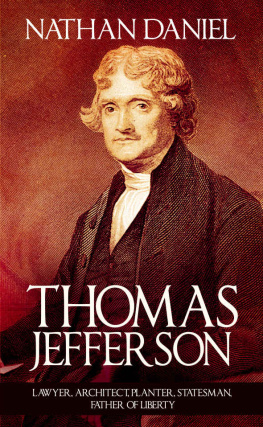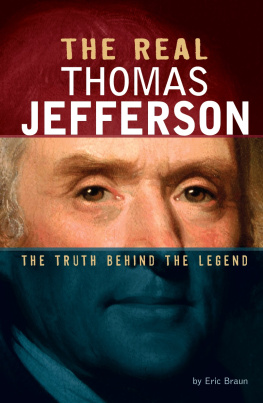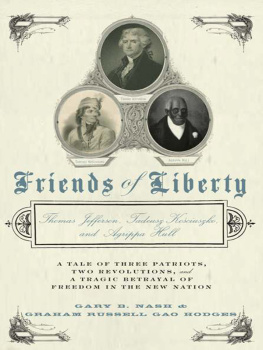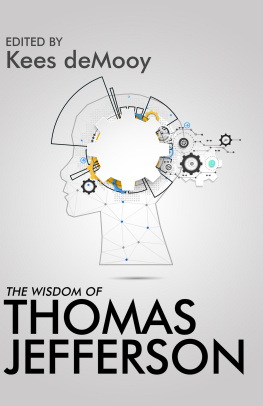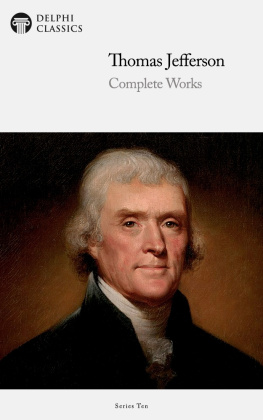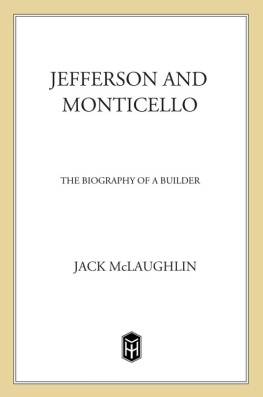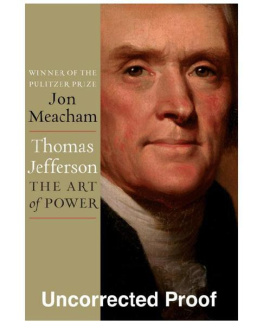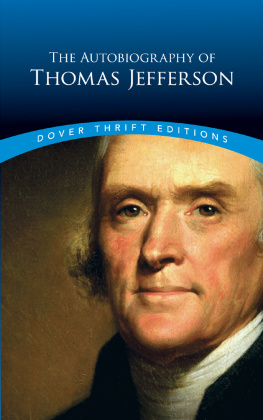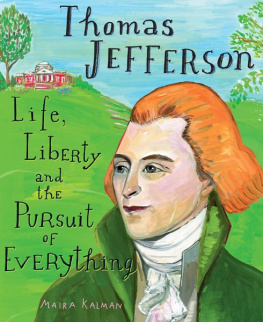Nathan Daniel - Thomas Jefferson: Lawyer, Architect, Planter, Statesman, Father of Liberty
Here you can read online Nathan Daniel - Thomas Jefferson: Lawyer, Architect, Planter, Statesman, Father of Liberty full text of the book (entire story) in english for free. Download pdf and epub, get meaning, cover and reviews about this ebook. year: 2016, genre: Religion. Description of the work, (preface) as well as reviews are available. Best literature library LitArk.com created for fans of good reading and offers a wide selection of genres:
Romance novel
Science fiction
Adventure
Detective
Science
History
Home and family
Prose
Art
Politics
Computer
Non-fiction
Religion
Business
Children
Humor
Choose a favorite category and find really read worthwhile books. Enjoy immersion in the world of imagination, feel the emotions of the characters or learn something new for yourself, make an fascinating discovery.
- Book:Thomas Jefferson: Lawyer, Architect, Planter, Statesman, Father of Liberty
- Author:
- Genre:
- Year:2016
- Rating:4 / 5
- Favourites:Add to favourites
- Your mark:
- 80
- 1
- 2
- 3
- 4
- 5
Thomas Jefferson: Lawyer, Architect, Planter, Statesman, Father of Liberty: summary, description and annotation
We offer to read an annotation, description, summary or preface (depends on what the author of the book "Thomas Jefferson: Lawyer, Architect, Planter, Statesman, Father of Liberty" wrote himself). If you haven't found the necessary information about the book — write in the comments, we will try to find it.
Nathan Daniel: author's other books
Who wrote Thomas Jefferson: Lawyer, Architect, Planter, Statesman, Father of Liberty? Find out the surname, the name of the author of the book and a list of all author's works by series.
Thomas Jefferson: Lawyer, Architect, Planter, Statesman, Father of Liberty — read online for free the complete book (whole text) full work
Below is the text of the book, divided by pages. System saving the place of the last page read, allows you to conveniently read the book "Thomas Jefferson: Lawyer, Architect, Planter, Statesman, Father of Liberty" online for free, without having to search again every time where you left off. Put a bookmark, and you can go to the page where you finished reading at any time.
Font size:
Interval:
Bookmark:
Thomas Jefferson:
Lawyer, Architect, Planter, Statesman, Father of Liberty
By Nathan Daniel
Copyright 2016 WE CANT BE BEAT LLC
Table of Contents
The year was 1743, April 13, when Thomas Jefferson was born. He was born on their family farm, Shadwell, which at the moment is adjoined to Monticello, Albemarle Virginia. Interestingly enough, not much was known about the true date of his birth, until after he had died. Several reports have been mentioned of attempts in writing to Jefferson, to ascertain the date of his birth through formal notifications by public bodies and individuals of interest. However, he would humbly decline these offers, insisting on the need for his privacy, and also insisted that the same privileges be extended to his family. Truly, he was such a private man.
One of the main reasons why he never wanted to have his date of birth revealed was because he knew this would eventually end up in some national honors bestowed unto him in regard to his birthday, and this was one of the luxuries that he considered repugnant.
Immediately after he was inaugurated in the year 1801 as the President, the Mayor and the Corporation of the City of Washington would wait on him to publicly declare his date of birth. Their interest was to be able to celebrate the anniversary of the birth of such an important individual who had bestowed such greatness and glory to them, and the country.
However, even this ploy would not come to be. While everyone was eagerly waiting for him to speak of his date of birth, he calmly replied that the only birthday that he would recognize was that of the liberties of his country.
This was not the end of the requests, because later on in 1803, August, Levi Lincoln, in representation of a higher association in Boston would again send him a letter, requesting him to make public his real date of birth, but in response, he mentioned that he disapproved of transferring the honors or celebration of the birthday of an individual, or sharing these honors amongst individuals. In line with the same notice, he therefore declined to let known his own birthday. At the same time, he also mentioned that his family was also under strict instructions not to communicate the same, and this would be the uniform answer that he would provide for all applications that were directed to him.
Jefferson was born to Peter Jefferson and Jane Randolph, who was a descendant of Isham Randolph, one of the seven sons of the Randolph family that settled in Dungeoness. When his father died, he left behind a widow, two sons and six daughters. Jefferson and his brothers inherited really huge estates. Thomas inherited the Shadwell estates where he was born and which at that time also included Monticello. His brother on the other hand inherited the lands on James River; Snowden, which was named after the imperial name of the familys birthplace. His mother on the other hand lived on to the year 1776, which was perhaps the most memorable year in the life of her son, and country.
At the tender age of 5 years, his father sent him to an English school where he would study for some 4 years. After he graduated from there, he was sent to a Latin school, where he spent another 5 years. During this time, he was studying under the guidance of a clergyman from Scotland, My. Douglass.
This was an important period in his life because it was during this time that he came to learn Greek and Latin, while at the same time his interest in French also peaked, and he learned that too. When his father died, he was only 14 years of age, and had no relative or friend who would provide him wise counsel or advise him on life.
When his father died, he was left under the care of Reverend Mr. Maury, who was to be his guardian and counsellor, so that he would get the necessary preparations in his life in order to make it through to college. He continued with his studies under Mr. Maury for another two years, then at the age of 17 in 1760, he joined the college of William and Mary, from where he graduated two years later. It is worth noting that at the time of his graduation, he was awarded the highest ever honors of that institution.
During the time that he was in college, he would be a remarkable student, and was popular with the students for his desire for solidarity. He was a patient student, one who preferred practical aspects of the learning process. Things were rather easier for him, because he was a student who possessed a high sense of apprehension, was a fast learner, had a really good memory, and his knack for logical combination really stood out.
One of his most favorable subjects was mathematics, and he excelled in math from the moment he joined college to the year he left. Other than math, he would also become a distinguished student, excelling in all the other disciplines. He also took a keen interest in science and philosophy and embraced the fine arts.
As a matter of fact, he was so interested in the fine arts that he acquired a unique and exquisite taste in architecture, sculpture and painting. His incredible skill actually made him gain recognition as one of the finest critics of his time for his tender age.
He was also passionate about music. He spent so many of his spare hours playing the violin. As he grew older, he took interest in the ancient classics, to the point where he would barely go through a day without spending some time reading some of these works.
With the knowledge database that he had acquired so far, it became even easier for him to take on the diplomatic duties that he would come to encounter in the course of his later life. By the time he was leaving college, he was able to read and speak fluent French, Italian and Spanish. Other than that he would also come to master the Anglo-Saxon dialect, which made it easier for him to interact with the rest of the population who spoke this dialect. He also picked an interest in legal philology.
It is worth noting that the acquaintances that he made in the course of the learning process actually played a significant role in shaping the course and direction that his ambition would take. Later on he would name the three people who played a significant role in making him the man he came to be; Dr. Small, one of his professors when he was still in school, who would come to be his companion on a daily basis, Gov. Fauquier, who he described as the most noble man to ever hold the position to which he was administered in the province, and finally George Wythe, the man who was the most faithful, loyal and beloved mentor he had when he was growing up, through his youth, and the most affectionate friend throughout his life. George Wythe was someone he actually looked up to like a second father.
From the moment he left college, Jefferson began to study law under instruction by Mr. Wythe. It is during this pupilage that he became better acquainted with common law and civil law. He studied all the topics and learned all the principles that he came across. It is also under apprenticeship for Mr. Wythe that he came to learn the neatness, the order and the skills necessary to be an astute business person.
Perhaps one of the best things that ever happened to Jefferson so far was the fact that he had access to the best guide, the best school and the best school of thought, which further stirred his intellectual greatness into being.
In 1767, Jefferson was introduced into the legal practice, by being admitted to the bar of the General Court. This was also under the influence of Mr. Wythe. By the time he was getting into the practice he had gathered enough knowledge of ancient legal precedence and the modern legal knowledge, commentary and texts. He had such a deep understanding of the law that it was so easy for him to quote passages of the law efficiently whenever necessary.
Next pageFont size:
Interval:
Bookmark:
Similar books «Thomas Jefferson: Lawyer, Architect, Planter, Statesman, Father of Liberty»
Look at similar books to Thomas Jefferson: Lawyer, Architect, Planter, Statesman, Father of Liberty. We have selected literature similar in name and meaning in the hope of providing readers with more options to find new, interesting, not yet read works.
Discussion, reviews of the book Thomas Jefferson: Lawyer, Architect, Planter, Statesman, Father of Liberty and just readers' own opinions. Leave your comments, write what you think about the work, its meaning or the main characters. Specify what exactly you liked and what you didn't like, and why you think so.

